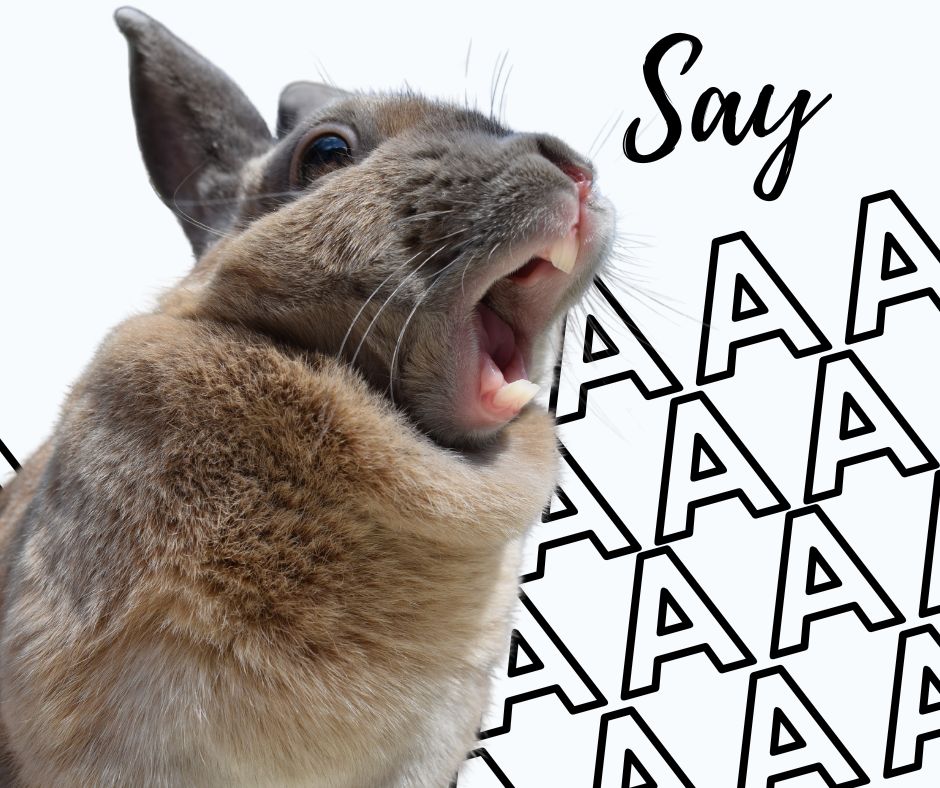
Tiny Teeth, Big Impact: Dental Health for Your Small Rodent Pets
Share
Have you ever wondered why your bunny's teeth keep growing? From playful mice to affectionate chinchillas, small mammals have a unique dental system. Their teeth never stop growing, and understanding this is crucial for their well-being. Neglecting their dental health can lead to painful toothaches, affecting their overall health and happiness.

Fascinating Facts About Small Animal Teeth
-
They Never Stop Growing
Mice, rats, hamsters, guinea pigs, chinchillas, and rabbits all have open-rooted incisors, meaning they grow continuously - up to 3-5 mm per week in some species.
Rabbits, guinea pigs, and chinchillas, who are herbivores, have continuously growing molars, not just incisors, in contrast to their omnivore friends like mice, rats, hamsters and gerbils, whose molars do not grow continuously.
-
Perfect Yellow is Perfectly Normal

Contrary to popular belief, yellow or orange teeth in rodents are not a sign of poor hygiene. It's a healthy enamel pigment called iron-rich dentine. This pigment not only gives their teeth a unique colour but also makes them stronger, dispelling any concerns about their dental health.
-
Rodents' Teeth Are Stronger Than Steel (Sort Of)
Rodent incisors can bite through wood, seeds, and even some softer metals because their enamel is harder than steel on the Mohs hardness scale.
-
They Self-Sharpen
Rodent incisors have enamel only on the surface and softer dentine at the back. When they gnaw, the dentine wears down faster, keeping the teeth's edges sharp like a chisel.
-
Misaligned Teeth Can Be Deadly
If the upper and lower teeth don't meet correctly (malocclusion), the teeth can overgrow into the cheeks, tongue, or jaw, preventing eating and leading to starvation.
The Hidden Symptoms of Dental Disease in Small Pets

Watch for These Warning Signs
Pets often hide pain, and dental pain is no different. Watch for drooling, weight loss, or selective eating, matted fur, visibly overgrown teeth, smelly breath or watery eyes. Tooth overgrowth or sharp spurs on the molars can cause significant pain and discomfort.
Overgrown incisors may be visible, but molar issues require a vet exam. If you notice any of these issues, please get in touch with your exotic vet promptly to make an appointment for your small pet.
Causes for Overgrown Teeth in Small Animals
-
Dietary Causes
Low-fibre diets fail to provide the wear necessary for healthy teeth, often leading to sharp spurs on the molars. On the other hand, certain sticky foods may also cause dental issues, like dried fruit that tends to get stuck on small pets' teeth.
-
Lack of Appropriate Gnaw Toys & Treats
Giving your small animal appropriate, safe gnaw toys and treats is more than merely about enriching their enclosures. It is also about providing them with the means to keep their incisors trimmed and their molars smooth. In long-haired breeds (like some guinea pigs), tooth issues can be hidden because weight loss is gradual.
Owner-Friendly Tips for Keeping Their Small Animals' Teeth Healthy
-
Provide the Right Species-Specific Chew Materials

Safe chews, such as untreated apple branches, willow branches, mulberry sticks, willow and seagrass toys, sekelbos chews, nibble tunnels and unprinted cardboard tubes, help naturally grind down incisors. Make sure you get the right chew toys for your specific small pet, whether you have mice, hamsters, rats, guinea pigs, gerbils, chinchillas or rabbits.
Avoid plastic toys that can break into dangerous shards.
-
Feed a Natural, High-Fibre Species-Specific Diet

For rabbits and guinea pigs: unlimited fresh hay is essential - it wears down molars and keeps the gut moving.
For other rodents, include hard foods and occasional unsalted nuts for gnawing. Please make sure that you are feeding food that is safe for your specific rodent/s, like mice, hamsters, rats, guinea pigs, gerbils, chinchillas and rabbits.
Also, make sure that you are feeding a balanced and nutritious dry diet for your mice, hamsters, rats, guinea pigs, gerbils, chinchillas and rabbits.
-
Regular Vet Dental Checks

Many dental issues aren't visible at home. A professional exam - often under sedation or anaesthesia- is essential for complete assessment, including x-rays or CT scans when needed. Exotic vets can check tooth alignment and length, too, during routine visits. Here is a general guide on how often to schedule a dental checkup for your small pet:
Recommended Dental Check-Up Frequency for Small Pets
| Species |
Teeth Type |
Routine Check-Up | High-Risk / Dental History | Notes |
|
Rabbit |
Incisors + molars grow continuously | Every 6 months | Every 3 - 4 months (sometimes every 2 months) | Molar spurs and jaw misalignment are common; hay is essential for prevention. |
|
Guinea Pig |
Incisors + molars grow continuously | Every 6 months | Every 3 - 4 months | Molar overgrowth is often hidden; regular hay helps keep teeth worn. |
|
Chinchilla |
Incisors + molars grow continuously | Every 6 months | Every 3 - 4 months | Very sensitive to dietary changes; dental disease can cause serious gut problems. |
|
Rat |
Incisors grow continuously, and molars are fixed | Every 6 - 12 months | Every 6 months | Overgrowth is rare if diet/chewing is adequate; watch for breaks and misalignment. |
|
Mouse |
Incisors grow continuously, and molars are fixed | Every 6 - 12 months | Every 6 months | Tiny size means dental issues can escalate quickly; check after every eating change. |
|
Hamster |
Incisors grow continuously, and molars are fixed | Every 6 - 12 months | Every 6 months | Offer hard foods and chew toys to prevent overgrowth. |
|
Gerbil |
Incisors grow continuously, and molars are fixed | Every 6 - 12 months | Every 6 months | Natural chewers, but teeth should still be checked during annual vet visits. |
Why These Intervals Matter
- Dental disease in small animals can develop quickly and silently - they often hide pain.
- By the time an owner notices obvious signs (such as drooling, weight loss, messy fur, or smaller poops in rabbits), the problem is usually advanced.
- Regular checks mean problems can be caught before they cause ulcers, abscesses, or starvation.
-
Encourage Natural Foraging

Scatter feed or hide treats in hay if you have small pets who may chew on hay. For small animals who cannot digest hay, hide the treats in hideys, tunnels, and other small pet-safe toys to promote interest and chewing with natural head and jaw movements that help wear teeth down evenly.
Warning: Don't Try DIY Tooth Clipping
Never attempt to trim incisors at home with clippers - this risks cracking teeth or root/nerve damage, which can be extremely painful for your pet and may lead to further dental issues. A vet should trim overgrown teeth with specialised equipment, under sedation, to ensure the safety and comfort of your small pet.
Last Thoughts
Understanding the unique dental needs of small mammals is crucial for their overall health and happiness. By providing a properly balanced diet, safe chewing materials, and regular veterinary check-ups, owners can help prevent dental issues that might lead to serious health concerns. Observing your pet's behaviour and remaining vigilant for warning signs can ensure that any dental pain is addressed promptly. With the proper care and attention, you can support your small pet's dental health, enabling them to lead a happy and fulfilling life. Remember, a little diligence goes a long way in keeping those tiny teeth in tip-top shape!
Resources:
- https://oxbowanimalhealth.com/blog/dental-disease-in-small-mammals/
- https://www.veterinary-practice.com/article/dentistry-of-small-companion-mammals
- https://en.wikipedia.org/wiki/Tooth
- https://en.wikipedia.org/wiki/Rodent
- https://www.acs.org/pressroom/presspacs/2024/april/iron-rich-enamel-protects-but-doesnt-color-rodents-orange-brown-incisors.html
- https://www.mpg.de/22034748/rodents-dentistry
- https://rodentfriends.com/pet-rat-teeth-trimming/
- https://pestologyltd.co.uk/understanding-rodent-gnawing/
- https://asknature.org/strategy/teeth-are-self-sharpening/
- https://bioengineering.hyperbook.mcgill.ca/rodent-adaptations-to-ever-growing-teeth-tooth-1/
- https://biologyinsights.com/the-function-and-anatomy-of-rodent-incisors/
- https://en.wikipedia.org/wiki/Mammal_tooth
- https://www.petplace.com/article/small-mammals/pet-health/small-pet-health/small-mammals-small-pet-health/malocclusion-overgrown-teeth-small-mammals
- https://www.bayswaterveterinaryreferrals.co.uk/article/important-dental-advice-for-rabbits-guinea-pigs-other-small-pets/#:~:text=It%E2%80%99s%20pet%20dental%20health%20month%20so%20at%20Bayswater,pigs%2C%20mice%2C%20hamsters%2C%20or%20rats%20a%20dental%20once-over.
- https://en.wikipedia.org/wiki/Rabbit_health
- https://www.afrma.org/dentalprobs.htm
- https://newvetequipment.com/blog/dental-care-in-small-mammals
- https://companion-animals.extension.org/dental-care-for-companion-rodents/
- https://lafeber.com/vet/dental-disease-in-rabbits-and-rodents/
- https://wpvet.com/general-care/small-mammals/routine-dental-care/
- https://www.thesprucepets.com/mouse-teeth-1238479
- https://www.hamsterssouthafrica.com/nutrition-food
- https://www.rvc.ac.uk/small-animal-vet/general-practice/practice-services/routine-pet-healthcare/pet-dentistry/rabbit
- https://www.goddardvetgroup.co.uk/blog/why-do-some-rabbits-need-regular-dental-checks/
- https://vet-healthcentre.co.uk/services-2/animals/small-pets/rabbits/regular-dental-check-up.html
- https://vetexplainspets.com/how-many-teeth-do-hamsters-have/
- https://www.msdvetmanual.com/all-other-pets/hamsters/routine-health-care-of-hamsters
- https://www.vin.com/apputil/content/defaultadv1.aspx?pId=19840&id=8249871&f5=1
